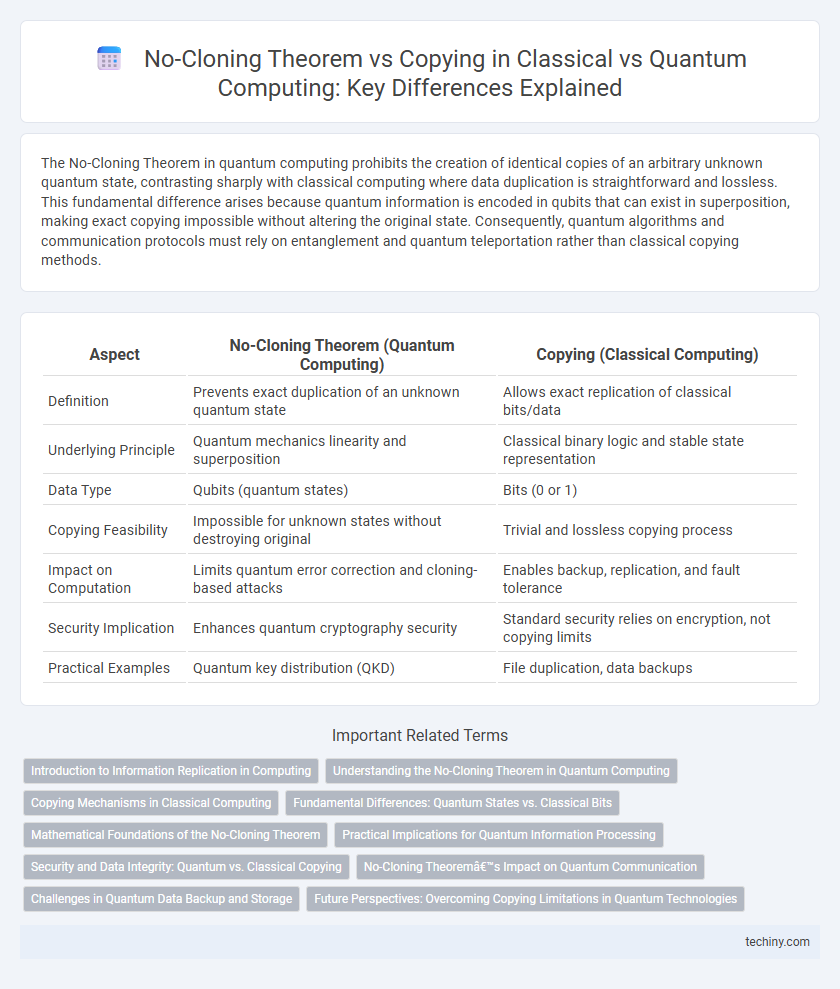The No-Cloning Theorem in quantum computing prohibits the creation of identical copies of an arbitrary unknown quantum state, contrasting sharply with classical computing where data duplication is straightforward and lossless. This fundamental difference arises because quantum information is encoded in qubits that can exist in superposition, making exact copying impossible without altering the original state. Consequently, quantum algorithms and communication protocols must rely on entanglement and quantum teleportation rather than classical copying methods.
Table of Comparison
| Aspect | No-Cloning Theorem (Quantum Computing) | Copying (Classical Computing) |
|---|---|---|
| Definition | Prevents exact duplication of an unknown quantum state | Allows exact replication of classical bits/data |
| Underlying Principle | Quantum mechanics linearity and superposition | Classical binary logic and stable state representation |
| Data Type | Qubits (quantum states) | Bits (0 or 1) |
| Copying Feasibility | Impossible for unknown states without destroying original | Trivial and lossless copying process |
| Impact on Computation | Limits quantum error correction and cloning-based attacks | Enables backup, replication, and fault tolerance |
| Security Implication | Enhances quantum cryptography security | Standard security relies on encryption, not copying limits |
| Practical Examples | Quantum key distribution (QKD) | File duplication, data backups |
Introduction to Information Replication in Computing
The No-Cloning Theorem in quantum computing prohibits the exact replication of unknown quantum states, contrasting sharply with classical computing where information can be duplicated perfectly through bit copying. This fundamental difference arises because quantum information is encoded in qubits that exhibit superposition and entanglement, preventing straightforward copying without altering the original state. Understanding this limitation is crucial for quantum information theory and developing secure quantum communication protocols.
Understanding the No-Cloning Theorem in Quantum Computing
The No-Cloning Theorem in quantum computing fundamentally prohibits the creation of an identical copy of an arbitrary unknown quantum state, contrasting sharply with classical computing where data duplication is straightforward and lossless. This principle arises from the linearity and unitary evolution of quantum mechanics, ensuring that quantum information cannot be perfectly cloned without disturbing the original state. Understanding this theorem is crucial for the development of secure quantum communication protocols and quantum error correction techniques.
Copying Mechanisms in Classical Computing
Classical computing relies on copying mechanisms where data can be duplicated freely without altering the original information, enabling error correction, backup, and parallel processing. Bits in classical systems can be copied precisely through logic gates and memory storage with no fundamental physical restrictions, unlike quantum bits which obey the No-Cloning Theorem. This unrestricted data replication is a cornerstone of classical information theory, facilitating reliable data transmission and system scalability.
Fundamental Differences: Quantum States vs. Classical Bits
The No-Cloning Theorem establishes that quantum states cannot be perfectly copied due to their inherent superposition and entanglement properties, contrasting sharply with classical computing where bits can be duplicated freely without loss of information. Classical bits exist in definite states of 0 or 1, enabling exact replication through standard copying processes, while quantum bits or qubits exist in probabilistic states that collapse upon measurement, preventing perfect cloning. This fundamental difference underpins the security and unique computational advantages of quantum computing over classical systems.
Mathematical Foundations of the No-Cloning Theorem
The No-Cloning Theorem, grounded in the linearity and unitarity of quantum mechanics, mathematically proves the impossibility of creating an identical copy of an arbitrary unknown quantum state. Unlike classical computing, where data copying relies on deterministic duplication of bit values, quantum states represented by vectors in Hilbert space cannot be cloned without violating the fundamental principles of inner product preservation. This theorem relies on the mathematical properties of linear operators, demonstrating that any hypothetical universal cloning operator leads to contradictions within quantum theory.
Practical Implications for Quantum Information Processing
The No-Cloning Theorem prohibits creating identical copies of an arbitrary unknown quantum state, fundamentally limiting data replication in quantum computing unlike classical computing where data can be copied perfectly. This restriction impacts error correction and secure quantum communication protocols, requiring alternative approaches such as entanglement-based methods and quantum teleportation. Practical quantum information processing relies heavily on these unique constraints to enhance security and computational efficiency beyond classical capabilities.
Security and Data Integrity: Quantum vs. Classical Copying
The No-Cloning Theorem forbids the exact duplication of unknown quantum states, ensuring quantum data security by preventing unauthorized replication and preserving data integrity. In contrast, classical computing allows perfect copying of digital data, which increases vulnerability to duplication-based cyberattacks and data breaches. Quantum cryptographic protocols leverage this fundamental principle to enhance security, making quantum information inherently resistant to cloning-based interception.
No-Cloning Theorem’s Impact on Quantum Communication
The No-Cloning Theorem prohibits the creation of identical copies of an arbitrary unknown quantum state, fundamentally distinguishing quantum communication from classical data replication. This constraint enhances the security of quantum key distribution protocols, such as BB84, by preventing eavesdroppers from perfectly copying quantum information without detection. Consequently, the theorem underpins the robustness of quantum cryptographic systems against cloning-based attacks, ensuring unprecedented levels of communication privacy.
Challenges in Quantum Data Backup and Storage
The No-Cloning Theorem in quantum computing prohibits the creation of identical copies of an arbitrary unknown quantum state, contrasting sharply with classical computing where data copying is straightforward and essential for backups. This fundamental restriction presents significant challenges in quantum data backup and storage, as quantum information cannot be duplicated without introducing errors or collapsing the superposition states. Consequently, developing reliable quantum error correction codes and entanglement-based protocols is critical to preserving quantum data integrity in the absence of classical-style duplication.
Future Perspectives: Overcoming Copying Limitations in Quantum Technologies
The No-Cloning Theorem fundamentally restricts the replication of unknown quantum states, contrasting sharply with classical computing's ability to freely copy information. Future quantum technologies aim to bypass these limitations through approaches such as quantum error correction, entanglement-assisted communication, and approximate cloning protocols. These advancements promise to enable reliable quantum information transfer and scalable quantum networks despite inherent cloning constraints.
No-Cloning Theorem vs Copying in Classical Computing Infographic

 techiny.com
techiny.com